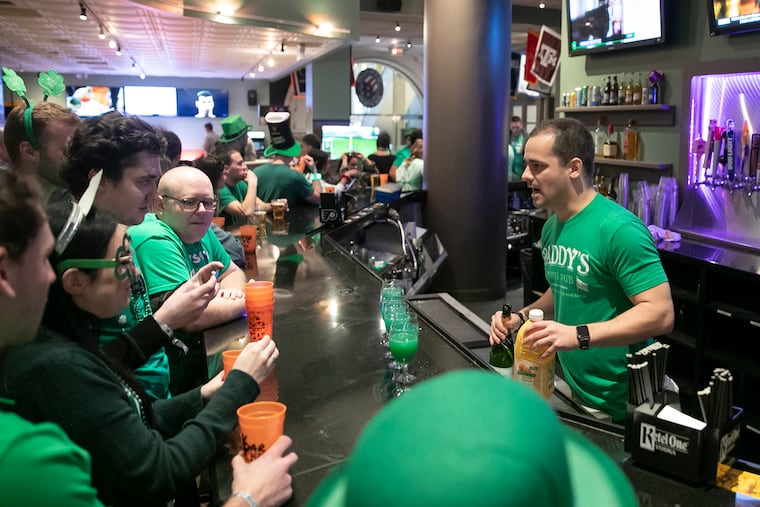The coronavirus is less deadly for young people, but doctors say they should still care about it
“There’s a social obligation to help protect the public, even if that doesn’t directly affect you."

The coronavirus pandemic has led many Philadelphians to begin preparing for significant disruptions to their lives, from emptying grocery store shelves to avoiding public transportation. But some young people are jumping at the chance to take advantage of cheap flights and hotel deals.
And before Mayor Jim Kenney shut down nonessential businesses on Monday, young people were still going out to bars and restaurants through the weekend.
This is not a smart move, physicians said, even if people under age 30 are less at risk for contracting coronavirus than older adults.
“Airplanes can be a potential means of getting the virus,” said Ron Goren, an infectious-disease specialist at St. Mary Medical Center in Langhorne and Nazareth Hospital in Philadelphia. “Even if you don’t get the virus, you could wind up in quarantine for two weeks. There’s a reason why flights are so cheap. It’s probably better to get a good book and Netflix, and hunker down for the time being.”
Lawrence Livornese, an infectious-disease specialist and the chairman of the department of medicine at Main Line Health, said that even though young people are at lower risk for dying from coronavirus, they need to follow recommendations from health officials to help prevent community spread. Research has shown that people can still spread the virus even if they’re not showing symptoms. Social distancing can help reduce the number of overall cases, keep the health-care system from being overwhelmed, and buy governments and the private sector time to develop treatments, testing kits, and other supplies.
“The whole concept of social distancing is to protect the community,” Livornese said. “There’s a social obligation to help protect the public, even if that doesn’t directly affect you."
Goren agreed. “From a purely societal point of view, we may run out of ICU rooms and ventilators,” he said. “Young people can make a contribution by doing the best they can not to get it, so they don’t spread it to other people they love who may be at a much greater risk than they may be at."
Preliminary research from China has shown that while most COVID-19 cases can be managed at home, 15% of people who get infected have to be hospitalized, and 5% of them require intensive care. The statistics from Italy, where the population is older and more susceptible, are more concerning — over half of infected individuals required hospitalization, and 10% needed treatment in the ICU.
“The more people that are sick, even if it’s a low percentage of 30-year-olds who get severely ill, that will be enough to flood the hospitals and stretch the health-care system,” said Henry Fraimow, an epidemiologist at Cooper University Health Care.
And for those young people who assume if they get COVID-19, they’ll develop immunity, experts caution that thinking is dangerous.
Fraimow said that physicians are not yet sure whether coronavirus immunity will work more like immunity to measles, which is lifelong, or like immunity to seasonal influenza, which can vary year by year due to small changes in the virus.
“For a lot of respiratory viruses, we have no preexisting immunity, especially when a new one like this shows up,” Fraimow said. “When you become infected, part of that response is that your body makes antibodies as a response, and the response gets more mature over the course of the infection.”
Goren cautioned that young people with underlying health issues, like asthma and diabetes, may be at greater risk. That’s a population that should be aware that they may run into trouble with coronavirus, he said.
He also pointed out that not all young people who have gotten the virus have survived. Last month, Chinese citizens mourned the death of 34-year-old Li Wenliang, the ophthalmologist in Wuhan who first tried to warn his peers that the viral infections could grow out of control. Two otherwise healthy 29-year-old medical professionals in Wuhan fell ill after working long hours, and only one recovered.
Doctors are also unsure of the long-term complications of contracting the disease. Livornese said that other respiratory viruses and infections can leave people with asthma, but cautioned that since the world is only two months into the outbreak, all preliminary reports must be taken with caution.
“Above all, get your information from reliable sources, like the CDC,” Goren said. “Don’t read social media. Do things like hand washing, hand sanitizing throughout the day. Bump elbows instead of hugging or shaking hands. Stay home if you feel sick and out of crowded areas, and don’t panic.”
Livornese said that when looking at other countries fighting the epidemic, there is no question about the seriousness of the situation.
“This is an event that’s unprecedented in most people’s lifetimes,” he said.